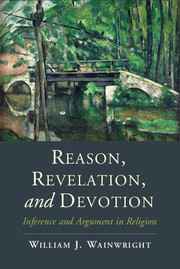Book contents
- Frontmatter
- Dedication
- Contents
- Acknowledgments
- Introduction
- 1 Four Examples of Religious Reasoning
- 2 The Purposes of Argument and the Person-Relativity of Proofs
- 3 Religious Reading and Theological Argument
- 4 Passional Reasoning
- 5 The Role of Rhetoric in Religious Argumentation
- 6 Reason, Revelation, and Religious Argumentation
- 7 Theology and Mystery
- Conclusion
- Notes
- Index
Introduction
Published online by Cambridge University Press: 05 December 2015
- Frontmatter
- Dedication
- Contents
- Acknowledgments
- Introduction
- 1 Four Examples of Religious Reasoning
- 2 The Purposes of Argument and the Person-Relativity of Proofs
- 3 Religious Reading and Theological Argument
- 4 Passional Reasoning
- 5 The Role of Rhetoric in Religious Argumentation
- 6 Reason, Revelation, and Religious Argumentation
- 7 Theology and Mystery
- Conclusion
- Notes
- Index
Summary
Rational beliefs can be grounded in perceptual experience, memory, testimony, rational intuitions, or inference. Other things being equal, beliefs grounded in any one of these ways are rational. For example, assuming that my memory is generally reliable and that I clearly remember having had toast for breakfast this morning, my belief that I had toast this morning is rational. The apparent self-evidence of “2 + 2 = 4,” or, “A whole is greater than its proper parts,” fully justifies my belief that 2 plus 2 is equal to 4 and that a whole is greater than its proper parts. A number of prominent philosophers of religion have argued that religious beliefs can be justified in a similar fashion. For example, William P. Alston, Richard Swinburne, Jerome Gellman, and I have argued that perceptual or quasiperceptual experiences of God occur and justify the religious beliefs of those who have them. Others such as Alvin Plantinga maintain that in certain circumstances, beliefs in God can be “properly basic.” That is, that like many of our memorial beliefs or beliefs in simple necessary truths, they can be fully justified without being grounded in further beliefs. Yet as Jonathan Edwards said in the mid-eighteenth century, “if we take reason strictly – not for the faculty of mental perception in general [which would include sense perception, memory, and rational intuition] but for ratiocination, or a power of inferring by arguments,” or reasoning, then “reason” refers to the faculty of rational inference and its exercises. The nature and proper role of inference and argument in religion is the subject of this book.
Until quite recently, philosophical studies of religious reasoning and argumentation have tended to focus almost exclusively on the validity of arguments for religious conclusions and the truth of their premises. This is not altogether surprising, since no invalid argument or argument with a false premise is a good argument. But even though truth and validity are necessary conditions of a good argument, they aren't sufficient, since an argument can meet both conditions and not be probative.
Arguments are constructed for various purposes, and these purposes must be taken into account when evaluating their success or failure. Furthermore, reasoning is always situated – it does not occur in a vacuum.
- Type
- Chapter
- Information
- Reason, Revelation, and DevotionInference and Argument in Religion, pp. 1 - 4Publisher: Cambridge University PressPrint publication year: 2015

